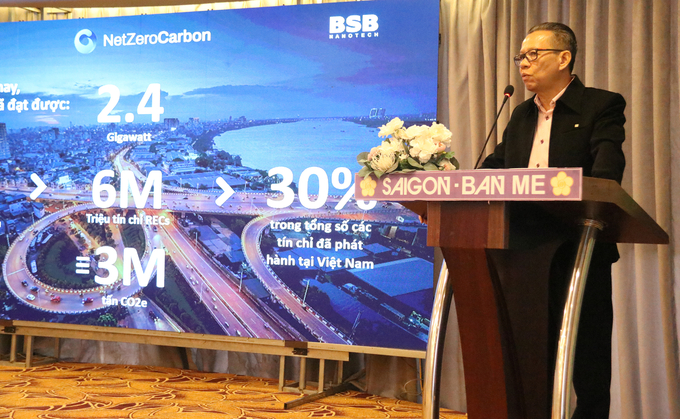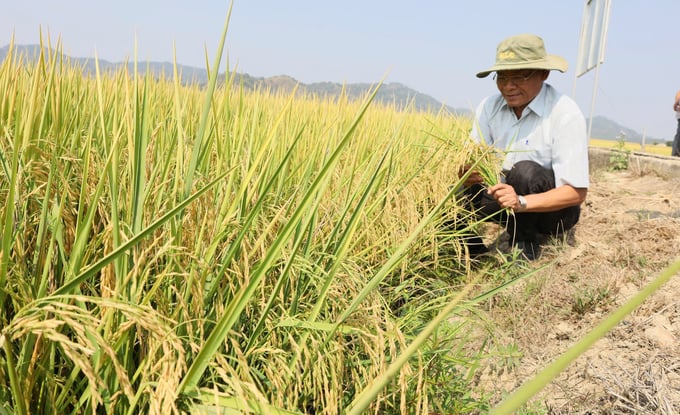June 19, 2025 | 03:52 GMT +7
June 19, 2025 | 03:52 GMT +7
Hotline: 0913.378.918
June 19, 2025 | 03:52 GMT +7
Hotline: 0913.378.918
On September 10, Dak Lak Department of Agriculture and Rural Development coordinated with Net Zero Carbon Joint Stock Company to organize a seminar on the closed process of "Cleaner, greener rice and increased productivity, measurement, underwriting and the reduction of greenhouse gas emissions".
A model piloting the green rice solution to reduce emissions and increase productivity is implemented in the 2023-2024 winter-spring crop on an area of 4.2 ha in Binh Hoa commune (Krong Ana district). The applied solution combines the alternate wetting and drying rice cultivation process of the International Rice Research Institute (IRRI), the use of nano composite products of BSB Nanotech Joint Stock Company and the emission reduction confirmation reporting process of Net Zero Carbon Joint Stock Company.

Tran Minh Tien, General Director of Net Zero Carbon Joint Stock Company, making a speech at the seminar. Photo: Quang Yen.
After more than three months of implementation, the model has brought positive results in comparison to the control model. The average yield reaches nearly 11.7 tons/ha, an increase of over 0.93 tons/ha. Seed costs are reduced by VND 675,000/ha (equivalent to 21.43%), fertilizer costs are reduced by VND 785,000/ha (equivalent to 6.20%), and pesticide costs are reduced by VND 1,431,000/ha (equivalent to 24.03%). The net profit of the model reaches nearly VND 94.8 million, an increase of more than VND 15.5 million (equivalent to 19.55%).
The model helps reduce greenhouse gas emissions by nearly 4 tons of CO2e per ha, contributing to environmental protection while using less irrigation water. This results in cleaner rice, and higher productivity, thus ensuring that yields do not decrease compared to traditional farming methods, farmers can lower investment costs.

Net Zero Carbon JSC buys nearly 17 tons of carbon from Dak Lak farmers’ rice fields. Photo: Quang Yen.
“My family has reduced investment costs and receives higher yield than average, which means much higher income. This year in particular, we earn more than VND 8 million from selling carbon credits, a significant boost in terms of profit. I plan to continue participating in the model of Net Zero Carbon JSC in the next crop,” said Le Nhu Hung (Binh Hoa commune, Krong Ana district), a farmer participating in the model.
The rice cultivation area in Dak Lak is currently stable at over 100,000 ha, accounting for approximately 35% of the province's annual crop cultivation area. Dak Lak's rice production ranks first in the South Central Coast and Central Highlands regions. Its average yield is 6.95 tons/ha, particularly in 2023 the output was estimated at 800,000 tons.

Dak Lak has a large rice area, suitable for implementing emission reduction production. Photo: Quang Yen.
According to Nguyen Van Ha, Deputy Director of Dak Lak Department of Agriculture and Rural Development, agriculture is one of the sectors most directly and severely impacting climate change. According to statistics, agricultural production in Vietnam emits nearly 80 million tons of CO2 into the environment each year, accounting for over 30% of the total CO2 emissions nationwide. Nearly 70% of CO2 emissions come from crop production activities, and rice production alone is responsible for 50% of total emissions in agriculture.
To reduce greenhouse gas emissions in rice cultivation, the implementation of synchronous measures is deemed essential. For example, farmers can utilize alternate wetting and drying instead of leaving rice fields flooded throughout the season, thereby helping to reduce methane emissions, but this type of solution requires the construction of an active irrigation system to apply appropriate technology and relatively large investment costs.
“Agriculture is considered a sector that causes a lot of emissions, so a sharp reduction in greenhouse gas emissions in agriculture associated with the upcoming recognition of carbon certificates will also become the direction that Dak Lak agriculture wishes to achieve. Creating better quality output products, environment-friendly agricultural product brands and stable income for farmers will be important steps of preparation to participate in the carbon credit market once it is operational in 2028,” Deputy Director Nguyen Van Ha said.

Net Zero Carbon JSC commits to purchasing USD 20 per 1 ton of CO2e. Photo: Quang Yen.
Tran Minh Tien, General Director of Net Zero Carbon JSC, says that the company is committed to accompanying farmers on this new journey. “The company has just released a report on emission reduction. Although this is not yet considered carbon credits, the company is still willing to make purchases. In this case, we offer USD 20/ton of CO2e. To come up with this price rate, we mainly take the efforts and the best interest of farmers into account. After performing calculations, we realize the cost for one ton of carbon is much higher than USD 20, but we can still make things work without collecting a single penny more from the people”.
The production model of Net Zero Carbon Joint Stock Company has high productivity and economic efficiency backed by reliable results. Therefore, many cooperatives and local agricultural sectors wish to access and apply it widely. On the occasion of the seminar, Net Zero Carbon JSC purchased nearly 17 tons of CO2e emissions from the model, and at the same time presented the Emission Reduction Certificate to Dak Lak Department of Agriculture and Rural Development.
Translated by Samuel Pham
/2025/06/17/2344-1-131758_261.jpg)
(VAN) Amid tariff risks and growing trade barriers in the U.S. market, Australia is emerging as a promising destination to sustain the growth momentum of Vietnam's shrimp exports.
/2025/06/17/2013-1-nongnghiep-112009.jpg)
(VAN) This notable growth trend reflects the global taste for fresh, nutritious fruits and the expanding use of lychees across various sectors.

(VAN) The political and cultural insulation of Japan’s beloved grain is falling apart, and experts warn the country’s relationship with the staple will have to adapt.

(VAN) Noting risks, report examines impacts of avian influenza, changing trade patterns since 2022, fish fraud, and shipping industry’s net-zero goals.

(VAN) Mr. Tran Quang Bao, General Director of the Forestry and Forest Protection Department, met and worked with the International Wood Products Association to promote cooperation in the field of timber trade.

(VAN) China's outbound shipments of rare earths in May jumped 23% on the month to their highest in a year, though Beijing's export curbs on some of the critical minerals halted some overseas sales.

(VAN) To sustain capital flow, administrative reform alone is not enough; what farmers truly need is an ecosystem where both government and businesses grow together in support.